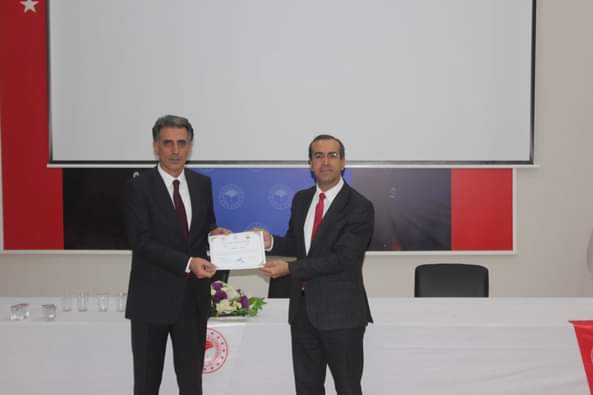

Animal breeding training was organized for farmers raising animals in Muş Province, in cooperation with our University, Muş Provincial Directorate of Agriculture and Forestry and Erzurum Eastern Anatolia Agricultural Research Institute Directorate. The training program was attended by our University's Vice Rector and Dean of the Faculty of Applied Sciences, Prof. Dr. Yaşar Karadağ, Deputy Director of Muş Provincial Agriculture and Forestry Eşref Süne and Eastern Anatolia Agricultural Research Institute Director Dr. Erdal Daşcı, Breeding Cattle Breeders Association President Cemal Aral, Breeding Sheep Goat Breeders Association President Nimet Salkın and Breeding Buffalo Breeders Association Vice President Nejat Emre, as well as more than 100 breeders from various towns and villages of Muş attended.
Making the opening speech at the training program held in the conference hall of Muş Provincial Directorate of Agriculture and Forestry, Karadağ stated that they signed protocols on training and R&D studies between Muş Alparslan University, Muş Provincial Directorate of Agriculture and Forestry and Erzurum Eastern Anatolia Agricultural Research Institute. Stating that within the scope of these protocols, Agricultural Engineers and Veterinarians within the Provincial Directorate provided training to farmers and 930 female producers in Muş, he stated that Anatolian Buffalo Breeding studies were also carried out in the hands of the General Directorate of Agricultural Research and Policies of Karadağ and Bitlis Province. In the program, Faculty of Applied Sciences, Department of Animal Production and Technologies Dr. “Points to Consider for Success in Cattle and Buffalo Breeding” by Faculty Member Onur Şahin, Eastern Anatolia Agricultural Research Institute Directorate Assoc. Dr. “The basic principles of profitable sheep farming and the importance of sheep farming in the region” and “The regional importance of pasture animal husbandry” by Sadrettin Yüksel, Vet. Hek. Ömer Alkanoğlu also gave training on "common animal diseases in the region and the importance of preventive medicine". At the end of the program, certificates were presented to the farmers who participated in the training.






